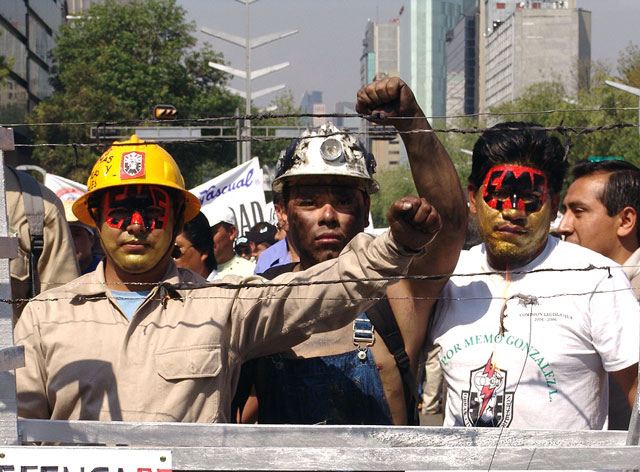The Mexican Preventive Police are preparing to occupy the facilities of the Central Light and Power Company in Mexico City in an attempt to break the militant Mexican Electrical Workers Union, according to the union.
The union warns that the quasi-military occupation of the plants could come within a week. Police have been used in the last three years to attempt to break strikes of miners and steelworkers as well as to try to crush popular social movements. Mexican police have previously been used to occupy the facilities of telephone workers and others to break strikes.
This current threat is the latest in a series of attacks on unions by the government of Felipe Calderón. The Calderón administration has spent three years trying to destroy the Mexican Miners and Metal Workers Union.
In September the government launched a multifaceted attack intended to destroy the Mexican Electrical Workers Union (also known by its Spanish acronym, SME). It's has been at the center of resistance to the government’s corporate-oriented programs.
The government’s attack has several elements. First, it’s supporting a small dissident faction within the union to meddle in the union’s internal life, with the goal of breaking its militant leadership. Second, the government, which is also the employer, is starving the budget for the state-owned Central Light and Power Company. Third, the government is calling for a change in company management and for the complete restructuring of the company.
RIVAL FACTION INVITES IN GOVERNMENT
The Mexican Electrical Workers Union has a long history as a rarity in the Mexican labor movement: a union which is both independent and democratic. Its elections have often been contested, rival factions argue out their differences within the union, and then they come together to fight the company and the government which stands behind it.
All of this changed earlier in the year. After a contested union election won by incumbent Martín Esparza Flores, a dissident group calling itself “Union Transparency” took its complaints to the Secretary of Labor. Seizing on the opening to inject government involvement in the union, Secretary of Labor Javier Lozano Alarcón (who has led the attack on the Miners union) has now refused to recognize Esparza Flores as head of the union.
The labor secretary may not only refuse to recognize the union’s officers, but may also declare the election invalid. In practice, these administrative procedures (which are nowhere found in Mexican labor law) are used against independent or democratic unions or against unions opposing government policies, and almost never against government-backed, employer-controlled, or gangster-run unions.
Without officers recognized and approved by the government, union officials cannot engage in collective bargaining or other union activities, leaving the union officially leaderless.
UNION HEADQUARTERS ATTACKED
On September 23, according to the elected union leadership, about 30 Union Transparency members together with about 150 other persons who were not members of the union, some of them armed, attacked the union headquarters in Mexico City, taking money, checkbooks, and records.
In a press conference held days later, Esparza showed security camera videos of the attack. The union also filed legal charges against Union Transparency leaders, and members voted to remove them from their union offices and to expel them from the union.
HEADING TOWARD PRIVATIZATION
The Calderón government proposes to gradually starve the Central Light and Power Company budget, reducing it from 641 million pesos next year to 163 million pesos by 2013.
Union leaders argue that this will lead to blackouts in the region it serves: the massive Mexico City Federal District, and the states of Mexico, Morelos, Puebla, and Hidalgo.
Between 1980 and 2000, there were constant battles over the budget and over the reorganization of the country’s nationalized electric power industry. Leaders from the ruling party at the time wanted to dissolve the Central Light and Power Company, which would have forced the independent electrical workers union to merge with the government-controlled Sole Union of Mexican Electrical Workers.
Now, the issue is somewhat different, though the process could also lead to the dissolution of Light and Power and a forced merger.
Calderón wants to break the Electrical Workers because the union has so far successfully resisted government plans to privatize the petroleum and energy industries. His administration now wants to privatize the electrical industry, including the Central Light and Power Company—and it must break the Electrical Workers to do so.
TOPPLING LABOR’S PILLAR
The government’s attack on the Electrical Workers union, one of the labor movement’s strongest pillars, represents an attack on the entire movement. The union created the National Front Against Privatization. It joined with the National Union of Workers and other worker, peasant, and social organizations to form a broader front, including the so-called Frentote that brought together virtually all progressive organizations.
In other words, the Electrical Workers have fought not only over union issues but also over social and political concerns of many other unions and the Mexican people as a whole.
Only a few other union organizations—such as the Authentic Labor Front (FAT) and the National Coordinating Committee of the Teachers Union (CNTE)—have played such a role. The attack on the Electrical Workers represents one more step in the rightward and authoritarian direction in which the Mexican government is moving.







